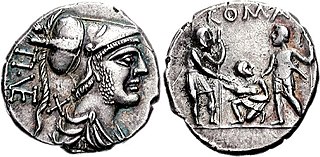Related Research Articles

The gens Atilia, sometimes written Atillia, was a plebeian family at ancient Rome, which rose to prominence at the beginning of the fourth century BC. The first member of this gens to attain the consulship was Marcus Atilius Regulus, in 335 BC. The Atilii continued to hold the highest offices of the state throughout the history of the Republic, and well into imperial times.

The gens Manlia was one of the oldest and noblest patrician houses at Rome, from the earliest days of the Republic until imperial times. The first of the gens to obtain the consulship was Gnaeus Manlius Cincinnatus, consul in 480 BC, and for nearly five centuries its members frequently held the most important magistracies. Many of them were distinguished statesmen and generals, and a number of prominent individuals under the Empire claimed the illustrious Manlii among their ancestors.

The gens Aquillia or Aquilia was a plebeian family of great antiquity at ancient Rome. Two of the Aquillii are mentioned among the Roman nobles who conspired to bring back the Tarquins, and a member of the house, Gaius Aquillius Tuscus, was consul in 487 BC.

The gens Cornelia was one of the greatest patrician houses at ancient Rome. For more than seven hundred years, from the early decades of the Republic to the third century AD, the Cornelii produced more eminent statesmen and generals than any other gens. At least seventy-five consuls under the Republic were members of this family, beginning with Servius Cornelius Maluginensis in 485 BC. Together with the Aemilii, Claudii, Fabii, Manlii, and Valerii, the Cornelii were almost certainly numbered among the gentes maiores, the most important and powerful families of Rome, who for centuries dominated the Republican magistracies. All of the major branches of the Cornelian gens were patrician, but there were also plebeian Cornelii, at least some of whom were descended from freedmen.

The gens Sempronia was one of the most ancient and noble houses of ancient Rome. Although the oldest branch of this gens was patrician, with Aulus Sempronius Atratinus obtaining the consulship in 497 BC, the thirteenth year of the Republic, but from the time of the Samnite Wars onward, most if not all of the Sempronii appearing in history were plebeians. Although the Sempronii were illustrious under the Republic, few of them attained any importance or notice in imperial times.
Lucius Aebutius Helva was a politician and general of the Roman Republic. He was consul in 463 BC with Publius Servilius Priscus, but died of the plague during his term.
Postumus Aebutius Helva Cornicen was consul at Rome in 442 BC, and magister equitum in 435.

The gens Annia was a plebeian family at ancient Rome. Livy mentions a Lucius Annius, praetor of the Roman colony of Setia, in 340 BC, and other Annii are mentioned at Rome during this period. Members of this gens held various positions of authority from the time of the Second Punic War, and Titus Annius Luscus attained the consulship in 153 BC. In the second century AD, the Annii gained the Empire itself; Marcus Aurelius was descended from this family.
The gens Apronia was a plebeian family at ancient Rome throughout the history of the Republic and into imperial times. The first member of the gens to achieve prominence was Gaius Apronius, tribune of the plebs in 449 BC. None of the Apronii obtained the consulship until the first century AD.

The gens Veturia, originally Vetusia, was an ancient patrician family of the Roman Republic. According to tradition, the armourer Mamurius Veturius lived in the time of Numa Pompilius, and made the sacred ancilia. The Veturii occur regularly in the Fasti Consulares of the early Republic, with Gaius Veturius Geminus Cicurinus holding the consulship in 499 BC. Like other old patrician gentes, the Veturii also developed plebeian branches. The family declined in the later Republic, with the last consular Veturius holding office in 206 BC, during the Second Punic War.

The gens Sestia was a minor patrician family at ancient Rome. The only member of this gens to obtain the consulship in the time of the Republic was Publius Sestius Capitolinus Vaticanus, in 452 BC.
The gens Sextia was a plebeian family at ancient Rome, from the time of the early Republic and continuing into imperial times. The most famous member of the gens was Lucius Sextius Lateranus, who as tribune of the plebs from 376 to 367 BC, prevented the election of the annual magistrates, until the passage of the lex Licinia Sextia, otherwise known as the "Licinian Rogations," in the latter year. This law, brought forward by Sextius and his colleague, Gaius Licinius Calvus, opened the consulship to the plebeians, and in the following year Sextius was elected the first plebeian consul. Despite the antiquity of the family, only one other member obtained the consulship during the time of the Republic. Their name occurs more often in the consular fasti under the Empire.
The gens Sextilia was a plebeian family at ancient Rome. The first member of this gens to achieve prominence was Gaius Sextilius, consular tribune in 379 BC. None of the family obtained the consulship, but they endured throughout Roman history from the early Republic into imperial times.
The gens Cominia was a minor plebeian family at ancient Rome, which appears in history from the Republic to imperial times. The first of this gens to hold the consulship was Postumus Cominius Auruncus in 501 BC, and from this some scholars have inferred that the Cominii were originally patrician; but all of the later Cominii known to history were plebeians.
The gens Duronia was a plebeian family at ancient Rome. Although relatively obscure, the family was of sufficient importance to hold a seat in the Roman Senate. Its members are mentioned during the first and second centuries BC.
The gens Egnatia was a plebeian family of equestrian rank at ancient Rome. Only a few of the Egnatii held any magistracies, of whom the most important may have been Gnaeus Egnatius, who held the praetorship during the second century BC, and served as governor of Macedonia, shortly after its institution as a Roman province.
The gens Villia was a plebeian family at Rome. Its members are mentioned in the first century of the Republic, but the only Villius who obtained the consulship was Publius Villius Tappulus, in BC 199.
The gens Oppia was an ancient Roman family, known from the first century of the Republic down to imperial times. The gens may originally have been patrician, as they supplied priestesses to the College of Vestals at a very early date, but all of the Oppii known to history were plebeians. None of them obtained the consulship until imperial times.
The gens Publilia, sometimes written Poblilia, was a plebeian family at ancient Rome. Members of this gens are first mentioned in the early decades of the Republic. The lex Publilia passed by Volero Publilius, tribune of the plebs in 471 BC, was an important milestone in the struggle between the patrician and plebeian orders. Although the Publilii appear throughout the history of the Republic, the family faded into obscurity around the time of the Samnite Wars, and never again achieved positions of prominence in the Roman state.
Agrippa Menenius Lanatus was consul of the Roman Republic in 439 BC and possibly the consular tribune of 419 and 417 BC.
References
- ↑ Robert Seymour Conway (1897). The records of Oscan, Umbrian and the minor dialects, including the Italic glosses in ancient writers, and the local and personal names of the dialectal areas.-v. 2, An outline of the grammar of the dialects, appendix, indices and glossary. University Press. pp. 9–.
- ↑ Dictionary of Greek and Roman Biography and Mythology , William Smith, Editor
- ↑ Dictionary of Greek and Roman Biography and Mythology , William Smith, Editor
- ↑ Dictionary of Greek and Roman Biography and Mythology , William Smith, Editor
- ↑ "Discussion of the Groma". University of Pennsylvania . Archived from the original on 2009-04-02.
- ↑ Titus Livius, Ab Urbe Condita xxxix. 9, 11, 19.
- ↑ Livy, 41.6
- ↑ Broughton, T. Robert S.; Patterson, Marcia L. (1951). The Magistrates of the Roman Republic. Philological monographs,no. 15, v. 1-2. Vol. 1. American Philological Association. p. 510.
- ↑ CIL I, 770, CIL X, 220;
- ↑ Degrassi A . Inscriptiones latinae liberae rei publicae (ILLRP). — Torino, 1963. — 549 ps. — P. 92. — № 607.
- ↑ Gebhard, Elizabeth R. (1993). "The Isthmian Games and the Sanctuary of Poseidon in the Early Empire". Journal of Roman Archaeology (Supplemental Series Number 8). Archived from the original on 2010-01-21 – via the University of Chicago Humanities Department.
![]() This article incorporates text from a publication now in the public domain : Smith, William, ed. (1870). "Aebutius". Dictionary of Greek and Roman Biography and Mythology .
This article incorporates text from a publication now in the public domain : Smith, William, ed. (1870). "Aebutius". Dictionary of Greek and Roman Biography and Mythology .